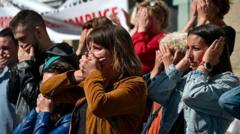The trial of Joel Le Scouarnec, a retired surgeon who has admitted to the sexual abuse of 299 victims, mainly children, has culminated amidst a cloud of frustration from the victims and their advocates. Initially expected to capture national attention, the proceedings in Vannes, Brittany, have drawn a muted response from the public, leaving many victims disheartened by what they perceive as indifference from society.
Manon Lemoine, a victim who has bravely shared her story in the courtroom, conveyed her exhaustion and anger, remarking, "Society seems totally indifferent. It's frightening to think [the rapes] could happen again." This sentiment is mirrored by approximately 50 other victims, who have formed a campaign group advocating for recognition and action from the government regarding the serious systemic issues highlighted during the trial.
The group has expressed their disappointment over the absence of a parliamentary investigation into the case, which, according to them, presents a "true laboratory of institutional failures." These individuals feel marginalized in their fight for acknowledgment, fearing that the sheer scale of their experiences renders them invisible to a society reluctant to fully confront the abhorrence of such crimes.
The stark contrasts between the Le Scouarnec case and previous high-profile trials, like that of Dominique and Gisèle Pelicot, are evident. The latter trial captivated public imagination due to its recognizable victims and the narrative of courage; in contrast, many speculate that the overwhelming number of victims has hindered mobilization around this case. Observers have noted that the very nature of the crimes committed against children leads to a cultural reticence to engage with the issue, creating what one lawyer termed "systemic, organised silence."
As the trial progresses toward its conclusion, the expected guilty verdict for Le Scouarnec appears guaranteed; however, activists raise concerns that the societal response may not shift significantly. Myriam Guedj-Benayoun, representing some of the victims, lamented the prevailing patriarchal structures that allowed such abuses to persist under the radar, calling for an urgent reevaluation of the systems that failed these children.
The courtroom has become a venue not only for justice but also for healing. For some victims, sharing their experiences has become a form of therapy, helping them process trauma they had long wrestled with in isolation. Others have found that reconciling past abuses with their present lives is a painful confrontation, but one that fosters understanding and community among those affected.
In the broader context of child protection, the Le Scouarnec case is a clarion call for reform, urging society to break the silence and advocate for the rights of the vulnerable. As the trial draws to an end, both victims and their advocates remain hopeful that this moment will ignite a gradual yet significant change in societal attitudes toward child safety and institutional accountability.



















